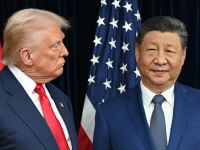Pakistan has told the Taliban's only ambassador to stop giving press conferences which have attracted worldwide attention but annoyed the United States, officials said Wednesday.
The ambassador to Islamabad, Abdul Salam Zaeef, was summoned to the foreign ministry on Tuesday afternoon and "asked to observe the diplomatic norms," ministry spokesman Aziz Ahmad Khan said.
"Any host country can ask a mission to stop statements or propaganda against any third country which has friendly relations with the host country," Khan told AFP.
The briefings held in the Taliban embassy garden in the Pakistan capital have become a huge international media draw because of Zaeef's unique position as the Islamic regime's only ambassador.
Pakistan is the only country that recognises the Taliban's Islamic Emirate of Afghanistan. But it is also a key supporter of the US-led anti-terrorism coalition against Kabul.
The bearded, turbaned Zaeef, 34, holds court alongside an imposingly large translator with a black patch over one eye, or with his deputy ambassador, Sohail Shaheen.
Other Taliban staff look nervously on at the dozens of journalists who sit crossed legged on the lawn.
Following Taliban policy, Zaeef severely condemns the US air raids in Afghanistan, frequently accusing the United States of "genocide", and defends accused terrorist leader Osama bin Laden.
He gives claims of civilian casualties that the White House in Washington says are "grossly exaggerated". The ambassador has said 1,500 civilians have been killed in Afghanistan since the US campaign started on October 7.
The embassy did not immediately comment on the government order. Embassy staff said Zaeef was unavailable for comment. They would not say if further press conferences were planned.
Following his summons to the ministry, Zaeef did not meet the press Tuesday. Normally he holds briefings nearly every day when he is in the Pakistani capital.
The conference has been so popular that it causes the worst traffic jam in Islamabad, choking the narrow Street 90 in the diplomatic district where the embassy is based.
At the end of each press conference since the September 11 attacks on New York and Washington, journalists fight over his words.
A brawl breaks out to get written versions of his opening statement, with reporters taking part lucky to get a torn corner.
Zaeef, who holds the religious title of mullah, listens carefully and never seems under pressure. If he does get angry at western questions, he never shows it.
The ambassador is even adept at showing a lighter side.
He joked about Australia's offer of 1,500 troops to the international coalition, commenting that "America is enough for Afghanistan, there is no need for Australia to come."
He even laughs with embarrassment if a question becomes too fawning.
But he also criticises journalists, such as a writer for an Arab newspaper who suggested that his translator was suspected of being a wanted a member of bin Laden's al-Qaeda network.
"That was wrong, very baseless and very distorted," said the ambassador, introducing his translator as Ahmad Ratif, a Pashtun from the Afghan city of Kandahar. "I think that if journalism comes to such a low level -- what can one say" -- ISLAMABAD, (AFP)
© 2001 Al Bawaba (www.albawaba.com)







